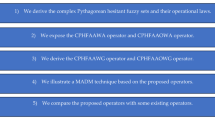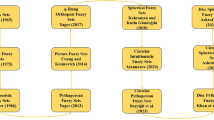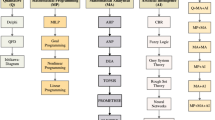Abstract
In general, for multi-criteria group decision making problem, there exist inter-dependent or interactive phenomena among criteria or preference of experts, so that it is not suitable for us to aggregate them by conventional aggregation operators based on additive measures. In this paper, based on fuzzy measures a generalized intuitionistic fuzzy geometric aggregation operator is investigated for multiple criteria group decision making. First, some operational laws on intuitionistic fuzzy values are introduced. Then, a generalized intuitionistic fuzzy ordered geometric averaging (GIFOGA) operator is proposed. Moreover, some of its properties are given in detail. It is shown that GIFOGA operator can be represented by special t-norms and t-conorms and is a generalization of intuitionistic fuzzy ordered weighted geometric averaging operator. Further, an approach to multiple criteria group decision making with intuitionistic fuzzy information is developed where what criteria and preference of experts often have inter-dependent or interactive phenomena among criteria or preference of experts is taken into account. Finally, a practical example is provided to illustrate the developed approaches.
Similar content being viewed by others
References
Atanassov K (1986) Intuitionistic fuzzy sets. Fuzzy Sets Syst 20:87–96
Atanassov K, Pasi G, Yager RR (2005) Intuitionistic fuzzy interpretations of multi-criteria multi-person and multi-measurement tool decision. Int J Syst Sci 36:859–868
Bustine H, Burillo P (1996) Vague sets are intuitionistic fuzzy sets. Fuzzy Sets Syst 79:403–405
Chen SM, Tan JM (1994) Handling multicriteria fuzzy decision-making problems based on vague set theory. Fuzzy Sets Syst 67:163–172
De SK, Biswas R, Roy AR (2000) Some operations on intuitionistic fuzzy sets. Fuzzy Sets Syst 114:477–484
Gau W, Buehrer DJ (1993) Vague sets. IEEE Trans Syst Man Cybern 23:610–614
Grabisch M (1995) Fuzzy integral in multicriteria decision making. Fuzzy Sets Syst 69:279–298
Grabisch M (1996) The representation of importance and interaction of features by fuzzy measures. Pattern Recogn Lett 17:567–575
Grabisch M (1997) Alternative representations of discrete fuzzy measures for decision making. Int J Uncertain Fuzziness Knowl Based Syst 5:587–607
Grabisch M, Murofushi T, Sugeno M (2000) Fuzzy measure and integrals. Physica-Verlag, NewYork
Hong DJ, Choi CH (2000) Multicriteria fuzzy decision-making problems based on vague set theory. Fuzzy Sets Syst 114:103–113
Ishii K, Sugeno M (1985) A model human evaluation process using fuzzy measure. Int J Man-Mach Stud 22:19–38
Keeney RL, Raiffa H (1976) Decision with multiple objectives. Wiley, New York
Klement EP, Mesiar R, Pap E (2000) Triangular norms. Kluwer, Dordrecht
Kojadinovic I (2002) Modeling interaction phenomena using fuzzy measures: on the notions of interaction and independence. Fuzzy Sets Syst 135:317–340
Li DF (2005) Multiattribute decision making models and methods using intuitionistic fuzzy sets. J Comput Syst Sci 70:73–85
Lin L, Yuan XH, Xia ZQ (2007) Multicriteria fuzzy decision-making methods based on intuitionistic fuzzy sets. J Comput Syst Sci 73:84–88
Liu HW, Wang GJ (2007) Multi-criteria decision-making methods based on intuitionistic fuzzy sets. Eur J Oper Res 179:220–233
Marichal JL (2002) Aggregation of interacting criteria by means of the discrete Choquet integral. In: Calvo T, Mayor G, Mesiar R (eds) Aggregation operators: new trends and applications. Physica-Verlag, Heidelberg, pp 224–244
Onisawa T, Sugeno M, Nishiwaki Y, Kawai H, Harima Y (1986) Fuzzy measure analysis of public attitude towards the use of nuclear energy. Fuzzy Sets Syst 120:259–289
Roubens M (1996) Interaction between criteria and definition of weights in MCDA problems. In: Proceedings of the 44th meeting of the European working group multicriteria aid for decisions, Brussels, Belgium
Sugeno M (1974) Theory of fuzzy integral and its application. Doctorial Dissertation, Tokyo Institute of Technology
Szmidt E, Kacprzyk J (1996) Remarks on some applications of intuitionistic fuzzy sets in decision making. Notes IFS 2:22–31
Wakker P (1999) Additive representations of preferences. Kluwer, Dordrecht
Wang Z, Klir GJ (1992) Fuzzy measure theory. Plenum Press, NewYork
Wei GW (2009) Some geometric aggregation functions and their application to dynamic multiple attribute decision making in the intuitionistic fuzzy setting. Int J Uncertain Fuzziness Knowl Based Syst 17:179–196
Xu ZS, Yager RR (2006) Some geometric aggregation operators based on intuitionistic fuzzy sets. Int J Gen Syst 35:417–433
Yager RR (1988) On ordered weighted averaging aggregation operators in multicriteria decision making. IEEE Trans Syst Man Cybern 18:183–190
Zadeh LA (1965) Fuzzy sets. Inf Control 8:338–353
Acknowledgments
The author is very grateful to the Co-Guest-Editor, Professor Hepu Deng and the anonymous referees for their insightful and constructive comments and suggestions, which have been very helpful in improving the paper. This work was supported by a grant from the Funds for Creative Research Groups of China (No. 70921001), the National Natural Science Foundation of China (Nos. 70801064, 70771010, and 70631004), the Ph.D. Programs Foundation of Ministry of Education of China (No. 200805331059), and the Philosophy and Social Science Foundation of Hunan Province, China (No. 08YBA021).
Author information
Authors and Affiliations
Corresponding author
Rights and permissions
About this article
Cite this article
Tan, C. Generalized intuitionistic fuzzy geometric aggregation operator and its application to multi-criteria group decision making. Soft Comput 15, 867–876 (2011). https://doi.org/10.1007/s00500-010-0554-6
Published:
Issue Date:
DOI: https://doi.org/10.1007/s00500-010-0554-6




